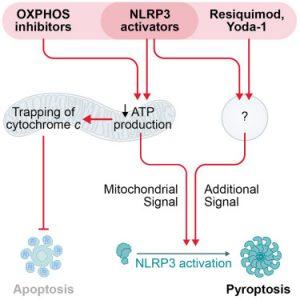The fate of cells under stress—whether they survive or undergo programmed cell death—relies heavily on their mitochondria. Researchers have uncovered how a sudden halt in energy production within mitochondria prevents normal cell death (apoptosis) and instead triggers an inflammatory response (Figure 1). These findings offer new insights into cellular decision-making processes and their implications for inflammatory diseases.
Mitochondria, often referred to as the “powerhouse” of cells, are responsible for producing ATP (adenosine triphosphate). The study highlights the dual role of mitochondria in maintaining cellular balance. When ATP production drops sharply, the protein cytochrome C, crucial for initiating apoptosis, remains sequestered within the mitochondria. This prevents cell death, even in the presence of external death signals.
Instead of undergoing apoptosis, the mitochondria activate inflammatory pathways, signaling potential danger and priming the tissue for a possible threat. This dual role allows mitochondria to decide between initiating silent cell death or triggering an immune response, thereby maintaining a balance between protecting cells and activating defense mechanisms. The study also identifies a specialised cellular sensor, NLRP3, that is activated when mitochondrial energy production ceases. However, this activation requires a second signal from other parts of the cell. This “two-signal mechanism” ensures that inflammation is only triggered when there is a genuine threat, preventing unnecessary inflammatory responses that could harm healthy tissue.
This mechanism plays a crucial role in targeted immune responses, enabling the body to defend against infection or damage while minimising collateral damage to healthy cells. Understanding this intricate interplay between mitochondrial function, apoptosis, and inflammation provides a clearer picture of how the body maintains tissue health under stress.
The findings have significant implications for diseases characterized by chronic or excessive inflammation, such as gout, type 2 diabetes, and severe cases of COVID-19.
Journal article: Saller, B.S., et al., 2024. Acute suppression of mitochondrial ATP production prevents apoptosis and provides an essential signal for NLRP3 inflammasome activation. Immunity.
Summary by Stefan Botha











